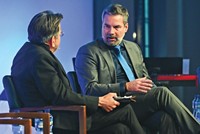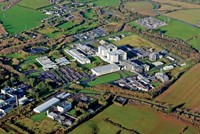Advertisement
Grab your lab coat. Let's get started
Welcome!
Welcome!
Create an account below to get 6 C&EN articles per month, receive newsletters and more - all free.
It seems this is your first time logging in online. Please enter the following information to continue.
As an ACS member you automatically get access to this site. All we need is few more details to create your reading experience.
Not you? Sign in with a different account.
Not you? Sign in with a different account.
ERROR 1
ERROR 1
ERROR 2
ERROR 2
ERROR 2
ERROR 2
ERROR 2
Password and Confirm password must match.
If you have an ACS member number, please enter it here so we can link this account to your membership. (optional)
ERROR 2
ACS values your privacy. By submitting your information, you are gaining access to C&EN and subscribing to our weekly newsletter. We use the information you provide to make your reading experience better, and we will never sell your data to third party members.
Business
Growth strategies for pharmaceutical chemical makers on display at CPhI
Frankfurt expo showcases a transformation in contract R&D and manufacturing of drug ingredients
by Rick Mullin
November 13, 2017
| A version of this story appeared in
Volume 95, Issue 45

The pharmaceutical chemical sector is experiencing a prolonged period of profitability and a wave of transformation as companies invest profits in new ventures and new capacity. A picture of how the sector is evolving came into focus last month when CPhI Worldwide, the annual pharmaceutical ingredients exhibition, came to Frankfurt.
The event—the largest of its kind in the world, attended by more than 40,000 people—followed a year and a half of robust merger and acquisition activity in the pharmaceutical chemical business.
For several of the companies exhibiting at CPhI, acquisitions fit a strategy of creating one-stop-shop contract development and manufacturing organizations (CDMOs) that serve all the needs of their drug industry customers. And for firms not involved in deals, big-ticket investments were a sign that the sector continues to be vital.
One of the biggest recent deals was Lonza’s $5.5 billion purchase of Capsugel, a provider of empty gelatin capsules and other drug delivery technologies. Less noticed was Lonza’s purchase of Micro-Macinazione, a small Swiss provider of drug powder micronization services.
Though quite different in size and scope, the two deals further Lonza’s goal of expanding beyond its traditional role as a manufacturer of active pharmaceutical ingredients (APIs), known in the industry as drug substance, and into the formulation of APIs into finished drugs, or drug product.
The gelatin capsule business, which makes up 80% of Capsugel’s sales, will continue as before, according to Christian Dowdeswell, a senior director for commercial development at Lonza. He emphasized the other 20% of Capsugel, a collection of drug formulation and delivery services that Capsugel assembled mainly via a string of acquisitions.
One of those purchases was of Powdersize, a Pennsylvania-based provider of nanomilling and micronization services, technologies key to improving drug bioavailability. Powdersize’s offering complements Micro-Macinazione’s and will allow Lonza to provide such services on both sides of the Atlantic.
Capsugel also bought Bend Research, a spray-drying expert, and Xcelience, a maker of dosage-form drugs for clinical trials. Lonza APIs were already being processed by some of these Capsugel businesses, Dowdeswell said, and now they are all under the Lonza roof.
CordenPharma also arrived at CPhI soon after making an acquisition—in its case a former Hospira plant in Boulder, Colo., that specializes in high-potency APIs, mainly for oncology. Michael Quirmbach, CordenPharma’s vice president of marketing and sales, said the facility is another in an array of assets for customers developing cancer drugs.
CordenPharma was created by its owner, International Chemical Investors Group, to acquire facilities no longer needed by the drug companies that built them. One of those facilities was a Roche plant, also in Boulder, that specializes in peptide and high-potency APIs. Other CordenPharma sites, such as a former AstraZeneca plant in Plankstadt, Germany, turn APIs for oncology and other markets into finished drug products.
Quirmbach said CordenPharma has sewn its various facilities together to provide a one-stop shop like the one Lonza is striving for. For example, he said, the firm can manufacture oligonucleotides in Boulder; conjugate them in Boulder or Switzerland to N-acetylgalactosamine, an amino sugar that facilitates protein drug delivery; and create a final drug product in Italy.
Other acquisitions highlighted in the booths of the Frankfurt show were also made to build up comprehensive service offerings. For Catalent, the recent $950 million purchase of Cook Pharmica filled portfolio gaps, according to Will Downie, Catalent’s senior vice president of business development. Cook will add drug-finishing capabilities and bolster Catalent’s biologics business with cell culture development, manufacturing, and packaging capacity.
Catalent, which is building on a backbone business in soft-gel oral dosage drug development and manufacturing, has doubled its biologics capacity this year by adding two reactors at its plant in Madison, Wis. Cook adds comparable capacity.
“We are trying to follow the puck,” Downie said, citing the growing roster of biotech drugs in development. “Biologics represented about 5% of our business, but with the tide of biologics in the pipeline, we needed to get bigger.”
Thermo Fisher Scientific’s $7.2 billion acquisition of Patheon—the largest and arguably most surprising deal of 2017— combined a leading lab instrument firm with a CDMO. Thermo Fisher has a clinical services division that helps drug companies manage clinical trials, but otherwise the purchase was a move into a new business.
From Patheon’s perspective, though, the deal filled a service gap. Patheon put itself at the vanguard of the one-stop-shop movement in 2014 when, as a formulation services specialist, it combined with DSM’s pharmaceutical chemical business. The clinical services division now completes the end-to-end services roster.
“We are firm believers in industry transformation,” said Patrick Glaser, head of small-molecule API development at Patheon. While conceding that some people are skeptical about the drug industry’s need for one-stop shops, Glaser pointed to the rise of biotech companies he describes as “two men and a molecule” requiring the full range of services. “We believe the business model is an attractive one,” he said.
Piramal Pharma Solutions, which has also been working toward broadening its service offering in recent years, is investing about $100 million to expand drug substance and drug product capabilities, according to Ramesh Subramanian, vice president of strategic marketing.
Current projects include a $45 million investment to boost late-stage and commercial API production in Hyderabad, India, and a $25 million expansion of a sterile filling and finishing facility in Lexington, Ky., that Piramal acquired in 2015.
Piramal is also spending $10 million to expand its latest North American acquisition, the high-potency API specialist Ash Stevens. “We are going to the highest level of potency now,” Subramanian said.
At its Detroit plant, Ash Stevens can make APIs that are then turned into antibody-drug conjugates at Piramal’s facility in Grangemouth, Scotland. Combine that with the Lexington fill and finish operations, and “we can do the whole nine yards when it comes to cancer,” Subramanian said.

Also emphasizing a full-service offering was China’s WuXi AppTec. Earlier this year the firm merged its API manufacturing division with its finished-dose drug business, establishing a single CDMO called STA Pharmaceutical that can cover work from preclinical stages to filing of new drug applications and commercial manufacturing.
STA has also been scaling up, said Yu Lu, executive director of corporate development and communications; it is spending about $200 million this year on drug product facilities in Shanghai and Wuxi, China, as well as API plants in Changzhou, China, and San Diego.
Not every company at CPhI was betting on an end-to-end service offering. PCAS, based in Longjumeau, France, focuses on the drug substance business, especially highly potent APIs. The firm spent $25 million in each of the past two years and expects to make comparable investments for the next two, according to Chief Executive Officer Vincent Touraille. The company has doubled its R&D efforts since 2015, most recently with the acquisition of a Covance research center in France.
PCAS was itself acquired earlier this year by Novacap, a diversified French company that entered custom API manufacturing in 2015 with the acquisition of the German firm Chemie Uetikon. Becoming part of Novacap is unlikely to result in big changes, Touraille said, noting that PCAS and Chemie Uetikon continue to operate as separate companies.
“What has changed is that it has given us more strength,” he said. “Novacap has a good financial background, so we will be able to invest more. These are industrial people. They understand risk and opportunity.”
Novacap is one of several firms that have recently moved into drug substance manufacturing. Another is Eurofins Scientific, a testing and analysis firm that bought or agreed to buy three firms this year: Alphora, an Ontario-based CDMO; Amatsigroup, a drug services firm in France; and Advinus Therapeutics, an Indian contract research provider.
A pending deal may see a French CDMO, Isochem, pass to PMC Group, a diversified company that until recently was involved only in specialty chemicals. Earlier this month PMC announced its entry into pharmaceuticals with the purchase of India’s Yegna Manojavam Drugs & Chemicals.
The other contender to buy Isochem is Axyntis Group, a French firm that, if it prevails, would make Isochem part of a pharmaceutical contracting enterprise that has made other acquisitions in recent years.
Isochem, owned by the German investment firm Aurelius, recently went into receivership after the cancellation of a drug intermediate order from Gilead Sciences. The company has four sites in France, three of which Axyntis would keep open, according to Axyntis CEO David Simonnet. In all, the firm has promised to keep on 214 of Isochem’s 270 employees.
Two companies with a history in precious metals and catalysts came to CPhI after rebranding themselves in part to emphasize their pharmaceutical service businesses.
One was Johnson Matthey, a British firm that is celebrating its 200th birthday this year. With a heritage in precious metals, JM was one of the first companies to manufacture cisplatin and carboplatin for chemotherapy, according to Garrett Dilley, the firm’s senior director for business development in the U.S.
The company is still an expert in highly potent and controlled substances, with an API sales mix that is about 75% generics and 25% exclusively synthesized compounds. But it is looking ahead to new approaches, Dilley said, as evidenced by its new alliance with the flow chemistry start-up Snapdragon.

Umicore, a Belgian precious metals competitor to JM, was at CPhI emphasizing its new slogan: “Let’s co-create.” Like JM, Umicore is a supplier of platinum-based chemotherapy compounds. But Christophe Le Ret, Umicore’s global marketing director, acknowledged that the market is mature.
“That’s why we have invested in labs to allow us to develop new molecules and offer custom R&D,” he said, referring to a new R&D facility in Hanau, Germany, where Umicore chemists work on highly potent compounds for customers.
Sourcing from China, a perennial topic of discussion at CPhI, took on greater urgency this year given a Chinese government crackdown on pollution. Executives in Frankfurt agreed that the effort will make supply from China less secure. Some people fear that fluorinated chemicals and other products now largely manufactured in Asia will no longer be readily available in the West.
“Prices are going up; plants will shut down,” said Guy Villax, CEO of Hovione, a Portuguese CDMO that also manufactures in China and Macau. While some API manufacturing has been moving from China back to Europe and the U.S., Villax noted that a huge amount of pharmaceutical actives and intermediates are still made in China.
“Everything that goes out of India as finished-dosage form came out of China as API or advanced intermediates,” he asserted. “I would say 70% of the pharma supply chains kick off with something made in China.”
Sources with Western companies that operate in China, however, warned that the Chinese government may decide to close whole industrial parks on the basis of a few bad actors.
“The Chinese government is doing something it should have done years before,” said Rudolf Hanko, CEO of the Swiss CDMO Siegfried, which also operates in China.
Hanko was not overly concerned about an impact on Siegfried. Nor was Gian Paolo Negrisoli, CEO of the Italian CDMO Flamma. The firm recently purchased 60,000 m2 of land near its plant in Dalian, China, where it hopes to expand.
“In recent years, our relationship with the authorities has been very good,” he said. Likening the company’s planning to the Chinese government’s, which has set 2025 as a target for upgrading its industry, Negrisoli said he hopes to add significant capacity by the same deadline.
Similar optimistic sentiments were shared across the expansive Frankfurt Messe exhibition compound. Some executives pointed to successful initial public offerings in the sector—notably Patheon’s and Catalent’s—and others noted the phenomenon of diversified firms seeking to establish businesses in pharmaceutical chemicals. Hovione’s Villax even suggested that the sector may be overheating.
“There is too much money and too many people out there,” he said. Though the new entrants generally have more of a foothold in health care than did chemical companies such as Dow Chemical and Rhodia that came in 20 years ago only to drop out, “it’s a complete replay of 1998 and ’99,” Villax said.
Advertisement
The show floor in Frankfurt held at least one example of a once-bullish diversified company jettisoning a contract API business. The British firm Sterling Pharma Solutions was spun off last year from Strides Shasun, a generic drug firm based in India.
“We have an innovator focus on deriving intellectual property for our customers,” said Sterling CEO Kevin Cook. “It really didn’t fit Strides’ mode of doing business.”
Sterling, with sales of $58 million in 2016, manufactures APIs from gram to commercial scale. It is currently broadening its operations with a $15 million investment in milling and micronization and new kilo labs and production trains. The company is shooting for sales of $85 million in 2017.
Cook notes that Sterling’s provenance reflects an earlier era of infatuation with the pharmaceutical services business. Set up by Sterling Drug in the 1960s, the firm’s Northumberland, England, facility was bought and sold a few times before becoming part of the CDMO ChiRex. Rhodia purchased ChiRex in 2000 for more than $500 million, then sold it to Shasun in 2006 for much less.
“What you find is those companies are product companies,” Cook said. “We are a service business.” Operations and investment decisions in the two types of businesses are fundamentally different, and Cook is skeptical of the prospects for diversified companies seeking to enter what they perceive as a lucrative market.
“I don’t think it worked then,” he said, “and I don’t think it will work now.”
With reporting by Michael McCoy.





Join the conversation
Contact the reporter
Submit a Letter to the Editor for publication
Engage with us on Twitter